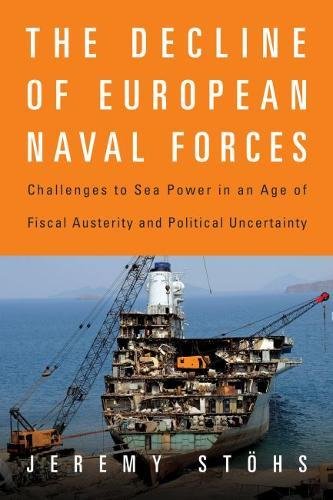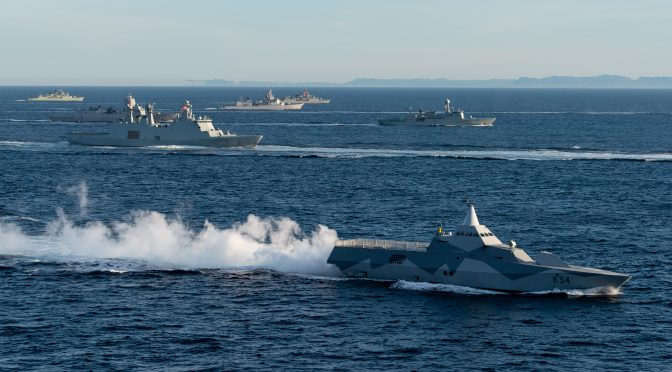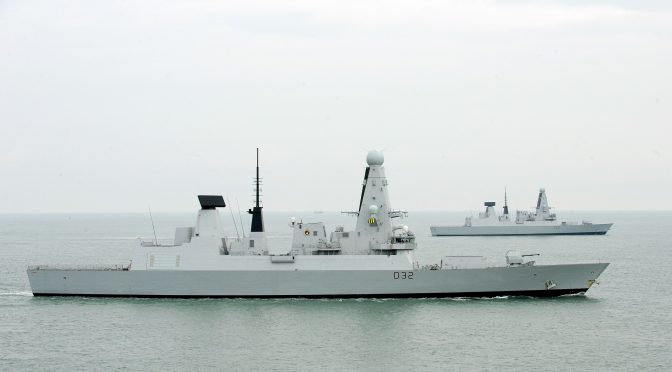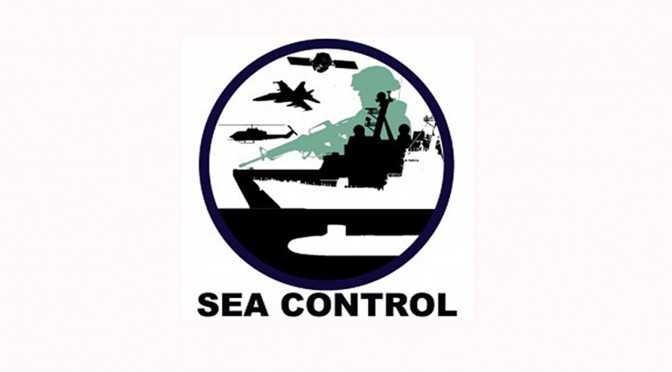Read Part One here.
By Roger Hilton
RH: You state that after the end of the Cold War many states had been able to consolidate their militaries despite fiscal restrictions. This all changed in 2007-2008, this groundswell of financial issues, tanking economies, and soaring national debt. You argue that even previous levels of defense spending and the corresponding force structures were unsustainable in many cases. It is evident that we have fairly polarizing periods here. On the one hand we have the reduced defense spending period of the immediate post-Cold War, and then the high defense spending in the latter 2000s, immediate post 9/11 era. Can you help us understand the short and long-term impact that the global financial crisis had on naval procurement?
JS: In the 1990s a lot of states still invested heavily in modernizing their militaries, and you see a real strengthening of naval forces. Just take a look at the Greek Navy; also the French are still spending quite a lot on national defense. The real problem really starts in the 2000s. Purely from a platform-centric point of view, much of the damage to European navies began in the 2000s I would say. You see the decommissioning of numerous vessels and platforms without replacements – the Danish submarine flotilla for example or large parts of the Dutch escort fleet. You have problems with procurement processes, you see this with the German and Spanish submarine programs. This was really exacerbated by the financial crisis, putting procurement projects on hold or canceling them outright. My British colleagues will attest to this, most infamously the cancellation of the British Nimrod maritime patrol aircraft, which left the Brits without any dedicated fixed wing maritime surveillance platform. But that’s just one of many examples.
RH: When it comes to specific examples in your book you describe a bleak picture that in the decline of the 2000s, on top of the financial crisis, it essentially removed some features of European navies, possibly for good. You cite the devastating example of the Dutch, who went from having one of the most capable Cold War fleets to what some observers describe today as a second-rate Navy. Could you elaborate a bit on this example?
JS: I think this is one of the best examples of the decline of European naval power. This also happened before the financial crisis. The Dutch defense studies postulated in 2003 and 2005, they spelled out that the Navy had to find a new balance, and this meant selling six of their frigate to Belgium, Chile, and Portugal. This would leave them with a fleet escort of a total of six frigates. And instead of buying new frigates, they would receive Holland-class OPVs, which while being the “Rolls Royce” of OPVs, don’t have the fighting power of a frigate of course.
And then you have at the same time the earlier 2000s, the fleet of Orion maritime patrol aircraft being sold to Germany, and all that happens prior to the crisis. I think what the crisis then did, including for the Netherlands, is that it significantly impacted training and readiness, and that definitely had long-term effects on naval forces. Another example is the new submarine that should be commissioned will probably be introduced sometime in 2028 or 2030, something like that, and the current submarines will have reached 40 years by then, which is quite a long period of time. So that just shows these long procurement processes and the problems they suffered.
RH: To shift to some encouraging news, despite the tight national purses that affected procurement, what are your thoughts on the FREMM project between France and Italy that was designed to build a multi-purpose frigate? In the book you said the project was deemed as a success, but is still subject to economic limitations. Today with more appetite for spending, is this a concept that can be recreated with success today?
JS: I like the FREMM frigates not only because they are beautiful ships, both the French and Italian version, and they might also be the U.S. Navy’s next frigate, so that this is a first…but what I find interesting is that this Franco-Italian cooperation project worked relatively well. They included lessons learned from the previous cooperation which was the Horizon project, an air defense destroyer, a trilateral cooperation between the British, the French and the Italians. It ultimately produced only two destroyers for France and Italy, and the British went on to produce their own destroyer, the Daring-class. What they learned is that you don’t have to build an identical ship, but actually can have some similarities and at the end of the day you have ships that are cousins. That really is an example of how corporations in the defense sector can work. But of course the French aren’t procuring nearly as many as they initially planned, and now they’re selling some to Morocco and Egypt. There are other examples but that is one.
RH: On Greek and Turkish maritime capabilities, you established that unlike most European nations, the Hellenic Navy had seen the fewest doctrinal changes. It remained focused on defending its adjacent waters and fulfilling its NATO obligations. At the same time you assert that the naval balance of power in the region had shifted to its traditional regional competitor, Turkey. How do you forecast the competition in the maritime domain playing out between these two ‘allied’ powers?
JS: This was the most interesting case study to me because those were two countries that in the 1990s and 2000s adhered to traditional national defense strategies and did not jump on the power projection bandwagon. You only see a little bit of it in Turkey’s force structure and operations, but Greece is really still adhering to territorial defense, SLOC protection, and it has the fleet for that.
You see a similar trajectory in recent years, both have had shed unnecessary addendums and allowed the older combatants and ships to be decommissioned to more effectively modernize their fleets through this period of the 1990s and 2000s. Both of them actually have larger fleets now than they had in the 1990s, not only in regard to the order of battle, but also more capable fleets relative to other powers.
Greece was of course hit very hard economically and put a number of programs on hold such as its fast attack craft and German submarines. Turkey on the other hand has incrementally been creating a capable domestic defense sector, despite setbacks. They’re really trying to create their own capability in terms of being able to build their own weapon systems, everything from tanks, UAVs, and now up to frigates. They started building licensed, state-of-the-art German submarines. Now they are also building the Spanish-designed TCG Andalou aircraft carrier which is a very interesting development of course for power projection.
But on the other hand, two caveats I want to add here, both of them have challenges they face, and one is of course fiscal for the Greeks. For the Turks, I believe it’s hard to imagine after two consecutive purges in the military so I’m told, that that has not had a negative effect on the Navy. While the current naval officers are loyal to President Erdogan, I would be looking over my shoulder if I were them.
The Turkish Navy also has to keep a close eye on the Russian fleet, which unlike the Baltic in my opinion, is considerably more powerful than it was a couple years ago. It’s a development that is evolutionary rather than revolutionary as long as Turkey remains in NATO.
RH: For the third period you cover, 2014 to the present, post Crimea annexation, we arrive at a juncture for European navies. The annexation of Crimea set off waves of reverberations that are still being felt today. Russia’s annexation caught policymakers by surprise, and in response to bolster their defense, actions taken by NATO and the EU have attempted to address this previous complacency. Compounding matters, as you state, is the proliferation of terrorist attacks in Europe, creating a permanent sense of insecurity. Then enter a wild card – President Trump’s America First nationalist policy and Washington’s rebalancing toward the Indo-Pacific region. When taken together these events have only amplified the sense of uncertainty. Is it a little too late for European naval forces to defend themselves without the full support of the U.S.?
JS: Does the U.S. have an interest in staying engaged in Europe? There is no doubt about it. I think for the foreseeable future, it’s a pipe dream to believe Europeans will gain full strategic autonomy from the U.S. I think that is a buzzword that is being spread in Brussels and throughout Europe. There are several areas in which the European Union wants to become truly autonomous. This includes politically, operationally, and also industrially and technologically autonomous.
And while there is a sense in the globalized world that there is such a sense of technological autonomy, I find it really difficult to believe that there will be operational autonomy, in terms if when push comes to shove and European states are engaged or see a necessity to engage in high-intensity warfare or a military campaign, they will not only need the U.S. they will need other European countries to support them in some way. I don’t see any scenario where that need will be lessened at the operational level, or at the political level. What they need is as much independence as possible, but that does not mean autonomy.
RH: As a product of this tumult you state how closer cooperation between Europe’s armed forces has emerged. Can you discuss some of the future and completed programs, and if this cooperative model is sustainable in the long-term when it comes to naval forces?
JS: What I think is important is that with respect to fiscal austerity, there is a very interesting idea on how European naval forces can deal with times of fiscal austerity. It provides four possibilities on fiscal austerity. First, shortcuts, or settling for less. Next, jointness and working with other military services. Then, multilateral and combined operations in cooperating with other states. And the fourth is leap-frogging or offsetting and using asymmetric technologies. European navies have been doing a bit everything, but their governments have been choosing number one too much, namely settling for less.
They are closing their interoperability gaps, which is an obvious problem of course. I have to say, we complain a lot, but no alliance has had better interoperability than NATO. There’s been discussion of including Japan and Germany in the Five Eyes agreement. We have a multitude of bilateral and multinational naval cooperation: the Swedish-Finnish efforts, the German-Dutch amphibious forces, the Belgian-Dutch BeNeSam; I could go on. What I would like to see is an equivalent of a NATO AWACS, or an equivalent to the aerial tanker and transport fleet. I thought when the deal didn’t go through with the Mistral-class amphibious assault ships the French were building for the Russians, that could have helped trailblaze this idea of having a ship under the NATO flag with different countries providing the crews and aviation platforms. But from what I heard it was discussed for about ten minutes and then the idea was laid to rest. But maybe ten years from now we’ll actually see something like that happen.
At the beginning I pointed out that even a land-locked country like Austria can have agency at sea, and Austrian Special Forces were deployed and embarked on a German vessel in an EU operation at sea. If 20 years ago you had suggested that the EU would be conducting naval operations in the Med, and there would be Austrian Special Forces embarked on that vessel, they would have probably thought you were crazy. But that just goes to show what naval forces can do, and that we all can contribute and that sea power is shared.
RH: Coming to the last point here in the third period, in parallel to this cooperation theme, you stress the need for nations to strike a capabilities balance. In search of harmony, how do European navies reconcile investing resources in high-intensity capabilities aimed at deterring conflict with other navies rather than in investing in low-intensity capabilities designed for the maintenance of maritime order?
JS: In general, what I currently see, at least in some circles, is that the pendulum has swung too far in one direction. Yes, I believe naval forces are built for warfighting, that’s their primary mission and function. But people are readily forgetting about all the other things naval forces can do, from constabulary duties, the diplomatic roles, that’s often brushed aside because it’s not as glamorous. I think we have to be careful that we don’t only emphasize that because for the first time naval forces will have to do really everything because the challenges are so great. The range of missions runs the gamut of the intensity spectrum and we can’t just say, well, we’ll do collective defense or anti-submarine warfare and we won’t worry about migration, for example.
What I argued for is that niche specialization is important. It provides small countries that have very limited budgets the ability to add something to the greater whole, to NATO or the EU for example. But that can be taken too far as well or not suffice. What I argue for are baseline capabilities. Rich states such as Germany and the Netherlands can invest in having balanced navies that can conduct a wide range of missions not specialize in niches. However, I think for smaller states that specialization can be dangerous because it can limit possibilities and can make you very dependent on others for aid.
The limit of course is GDP, and whether there is funding for naval forces. For a Latvia or a Slovenia that will be difficult. But what is necessary is prudent thinking about contributing to naval operations. I mentioned earlier Austrian boarding teams that can be deployed on EU missions or the possibility of a small Swedish warship operating off the Horn of Africa.
I would also argue to not make the mistakes of the past. Perhaps as a scholar that didn’t live through the Cold War, it seems to me I see people reverting to an older, more comfortable view. Kaliningrad Oblast is often described by NATO zealots as a seemingly impenetrable fortress that renders all NATO and partner navies in that area sitting ducks. A scholar at the Center for Naval Analyses in Virginia, Steven Wills, who has a piece on CIMSEC, discussed how the West got Soviet naval strategy entirely wrong in the 1960s and 1970s. I wonder today if we’re prudent enough to get our analysis right.
RH: Let’s return to our initial question. Are European naval forces doomed to impotency, or is reform and renewed power projection possible? How do you rate their chances for success?
JS: I wrote an article recently for The Naval War College Review titled “Into the Abyss” where I argued that by 2014 the situation was quite bleak. The decline was so pronounced in many of the navies and their capabilities were so atrophied that this really called into question their ability to provide credible deterrence. And they were smaller than any time in recent history, they lost capability, and the idea of deploying them in contested environments had almost been forgotten. There was a preoccupation with low-intensity operations, counter-piracy operations, but the basic function of warfighting had been forgotten to a certain extent.
But, at the same time, I see light at the end of the tunnel. I know for a lot of people who want to see change happen quickly and see budgets rise very quickly. It bears remembering that in the 1990s they were using vessels designed in the 80s and 70s, so it will take time for the changes to take place and we have to be very smart in the risks we assume in defense spending. But I do see light at the end of the tunnel what European naval forces are concerned.
RH: This positivity you’re sharing with us is certainly an exercise in patience and prudent decision-making in defense spending. Looking to the future, do you have any last strategic takeaways that we should be conscious of?
JS: For anyone who is interested in European naval matters it is important to scale down your expectations. European navies and their militaries are sometimes seen as collectively powerful because Europe as a whole is more populous than the United States and its cumulative GDP is also higher. The United States and Europe are similar, so it seems. And that’s a very inviting idea, but it just does not work because Europe has different states with very different interests.
It’s important to remember that the individual defense budgets of the respective states are but a fraction of that of the United States. But what is more important for the smallish navies is that they still play an important role in the freedom of the seas and good order at seas, and also in military operations. There is a necessity for far greater research on European naval forces, especially of their development over the past decades. There is very little comprehensive research on what they have been doing, what their policies were, what they changed what the force structures were, and so on. So, I am just trying to contribute to that a bit.
Finally, as a strategic takeaway, without giving away too much of what’s in my book, I believe that in an age of great power competition it is very likely that the 21st century will be one of continued American naval power despite all the naysayers. I believe it will also be an era of rising (or already risen) Asian naval power. The question is really to what degree it will involve European sea power and naval power.

I encourage readers to reach out to us at ISPK and the Center for Maritime Strategy and Security to discuss these pressing questions. We believe shared knowledge is empowerment.
RH: On that note Jeremy, thank you for taking the time for helping us to discuss this pressing but under-the-radar issue. If our readers would like to follow up on Jeremy’s work, please check out his book The Decline of European Naval Forces. You can also look for the Routledge handbook of Naval Strategy and Forces, edited by Sebastian Bruns and Joachim Krause, which is an indispensible resource. For more info on the book and other podcasts, don’t forget to visit https://www.kielseapowerseries.com/en/ and follow us on Twitter at @SeapowerSeries for more updates.
Jeremy Stöhs is a security and defense analyst at the Institute for Security Policy at Kiel University (ISPK) and its adjunct Center for Maritime Strategy & Security as well as a fellow at the Austrian Center for Intelligence, Propaganda & Security Studies (ACIPSS).
Roger Hilton is the defence and Security stream manager at GLOBSEC, a global think-tank based in Bratislava, Slovakia as well as a research fellow at the Canadian Global Affairs Institute (CGAI).
Featured Image: Norwegian Sea, Nov 7. 2018. TRIDENT JUNCTURE 18 PHOTEX. (NATO Photo by Wo Fran C. Valverde)




